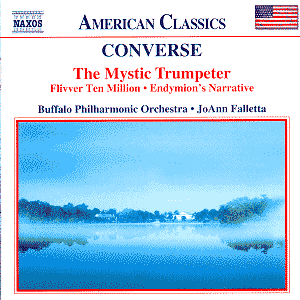Converse’s studies proper – after graduation
from Harvard – began with George Chadwick in Boston and subsequently
with Rheinberger in Munich. The air of German academicism has
clung tenaciously to Converse’s posthumous reputation despite
the fact that The Pipe of Desire (1905) was the first American
opera to be performed at the Met in New York in 1910. His theatrical
career though never blossomed; later works never receiving stagings.
Looking at his worklist in Baker’s one can see that he did his
fair share of contributing to the oratorio tradition. What, one
wonders, is Job like – a dramatic poem for soloists and
chorus first performed at the Worcester (Mass) Festival in 1907
and the first American oratorio to be performed in Germany? Indeed
his oratorio and cantata output was notable. He clearly relished
settings for voice: La Belle Dame sans merci dates from
1902. He had excellent opportunities to write for such notables
as Schumann-Heink for whom he wrote Hagar in the Desert, a
work she took to Hamburg in 1908.
But what little reputation Converse’s name now
carries is inextricably bound up with the tone poem. Here in one
of the latest instalments of Naxos’s American Classics series
we have three such examples. The Mystic Trumpeter is based
on Whitman’s Leaves of Grass and Converse employs five
sections in his tone poem, broadly moderato, amoroso, Allegro
con molto fuoco, Adagio lamentoso and a grazioso final section.
The sectionality is highlighted by poetic superscriptions (Mystery
and Peace, Love, Joy etc) though the composition is seamless and
deft. There is no doubt that Converse was a splendid orchestrator;
the examples are everywhere to be heard. However, equally and
ominously, the words "superb orchestrator" are often
synonymous with "lack of distinctive harmonic and melodic
invention." This is not invariably the case but it is part
of the Converse Problem. The overarching Wagnerianisms and Straussian
influence on The Mystic Trumpeter are hard to avoid though
they are never blatant or crude. The work is sympathetically laid
out with a particularly emotionally charged melodic curve from
11.10 though for much of the time the thematic material hangs
fire. The final eruptive anticipations of Joy, the final section,
are brassy and delightful however. Flivver Ten Million
(‘flivver’ is slang for one of Ford’s cheap cars) is a twelve-minute
piece following hard, it is always alleged, in the musical footsteps
of Honegger’s Pacific 231 in its depiction of industrial
power. That said, I doubt, judging from the date of composition,
and style, that Converse could have heard much Honegger much less
Mossolov. Given his literary inclinations Converse headed the
eight sections with cod expressive titles such as The Din of
the Builders, The Joy Riders, and my favourite Phoenix
Americanus – the Hero, righted and shaken, proceeds on his way
with redoubled energy, typical of the indomitable spirit of America
(great fun). Here’s Converse in relaxed mood, loosening himself
from those academic shackles, for a brief respite of pictorial
colour. So this atmospheric piece takes in hammer blows and construction
noises, imbued all the while with a Straussian mini-epic quality.
There are Ford car horns, a little romantic interlude, good time
percussion, a pesky triangle, whistles and wails before an automotive
pile up concentrates the musical mind. After which there’s some
flaky Barnum and Bailey stuff before an inconclusive ending –
a rather abrupt one, as if the celebratory life force just unleashed
is somehow still going on, distantly, unheard. Perhaps the most
accomplished of the three works, in terms of sheer deft and imaginative
writing is concerned is Endymion’s Narrative. The previous
year Converse had set The Festival of Pan, itself based
on Keats’ ‘Endymion’. The later work concentrates on the struggles
of the mind. It opens with solo string lines and extreme romantic
tracery, becoming more energetic and decisive but still embodying
and exemplifying those still very current academic influences
previously alluded to. It’s a finely constructed if ultimately
not particularly distinguished symphonic poem that shows the thirty-year
old not yet quite settled though also displaying a degree of potential.
The much earlier Louisville/Mester recording
of Flivver Ten Million and Endymion’s Narrative is
back in the catalogue (Albany TROY 030-2). I’ve not heard it –
but Naxos does include The Mystic Trumpeter. At 53 minutes
this is not an especially generous timing and whilst I’m by no
means prescriptive about this sort of thing it would have been
valuable to have included, say, the Elegiac Poem or the
early overture Euphrosyne (Boston, 1903) amongst others
that could have been selected. Still, those not seeking unmistakable
greatness might find Converse’s canvass sympathetic enough for
company.
Jonathan Woolf
See also
review by Rob Barnett

